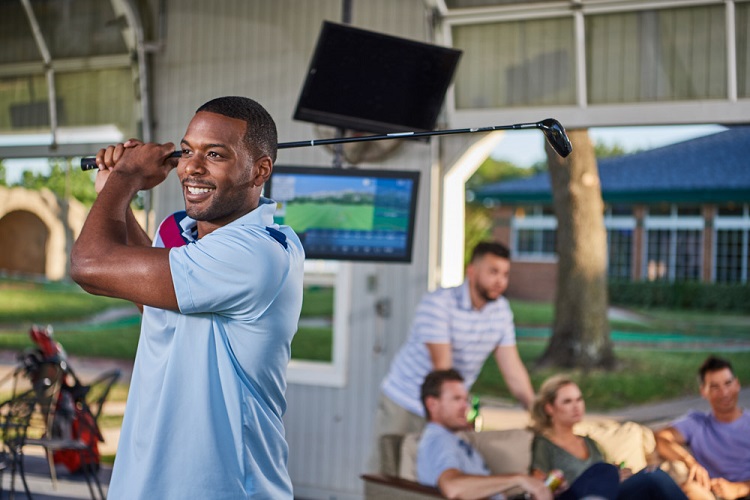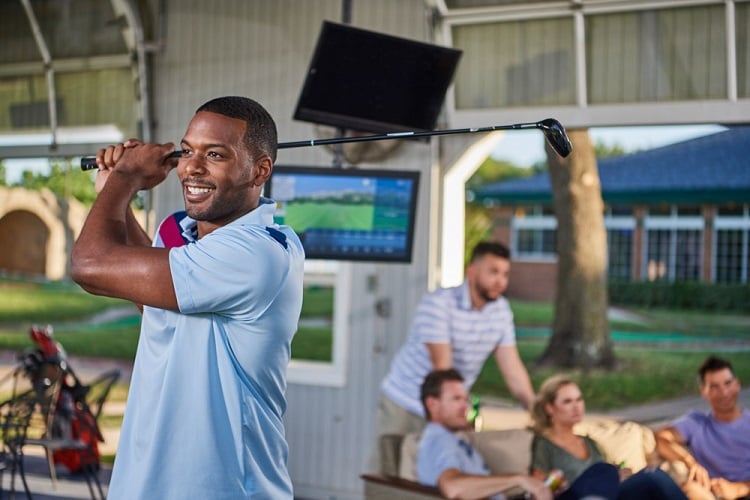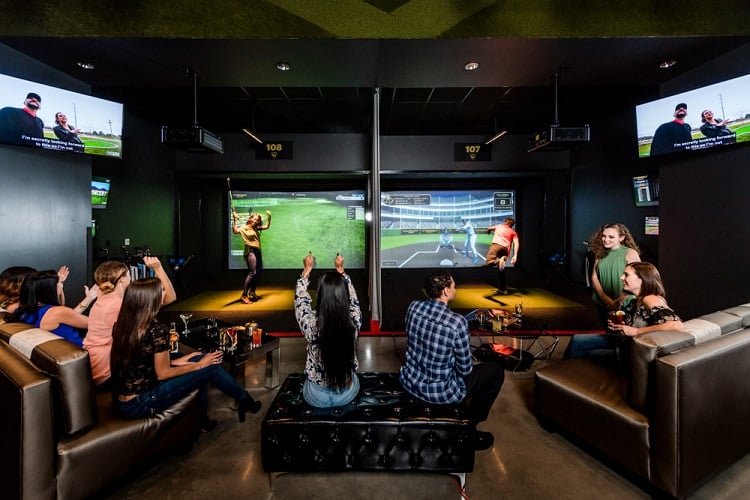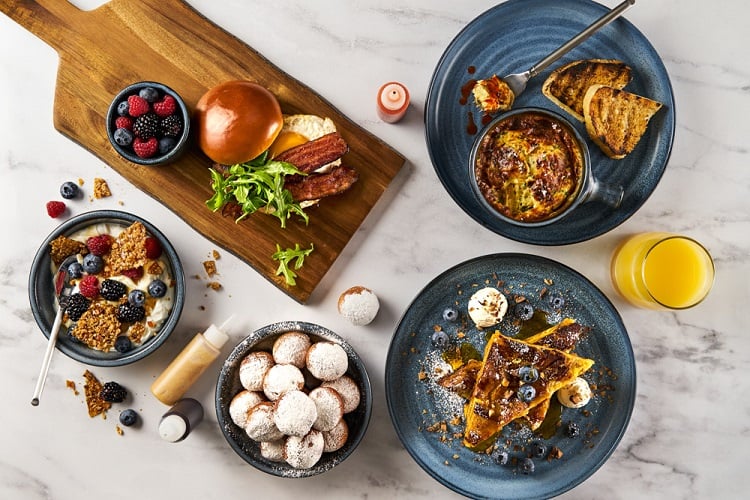Topgolf eyes growth beyond the Front Range
Now thriving in Thornton, the golf entertainment brand eyes global expansion and an IPO
Susan Fornoff //April 30, 2020//


Topgolf eyes growth beyond the Front Range
Now thriving in Thornton, the golf entertainment brand eyes global expansion and an IPO
Susan Fornoff //April 30, 2020//

Snow covers the ground in Thornton on this blustery Saturday in January, and local golf courses are closed. One regular foursome of middle-aged men has nonetheless dusted off their clubs, snapped on their golf gloves and ordered up their usual swing oil—a round of draft beer.
Now they’ll take on the course of their choice, aided by microchip-embedded balls and the Toptracer technology at Thornton’s Topgolf, the second rollicking location of the now-global sports entertainment giant to open in the Denver area and 56th worldwide.
“They’re from up north and they still have snow drifts, so they’re tickled to be able to come down here and get their swings in,” says General Manager Dennen Van Wagner. He surveys the rest of the action in the three-story, 165,000-square-foot funhouse, with its 102 heated hitting bays, two belly-up bars and hundreds of tables throughout. “But, look around: We’ve got every demographic here, including parents, kids, grandkids, great-grandkids. Would you ever see this at a golf club? Never. Never, ever, ever, ever. Half of my guests have never picked up a club. But they can come here for an hour or two, and everyone has fun.”
The golf establishment ridiculed Topgolf when it was launched in the United States in 2005 (first stop: Alexandria, Virginia) by twins Steve and Dave Jolliffe. Too gimmicky, too kitschy, and, worst of all, not real golf: A ball pops out of a machine for a player to hit at targets, with scores automatically kept on a video screen while the rest of the group eats, drinks and socializes.
But by the time it opened its Centennial venue in 2015, No. 20 of the brand, the USGA and PGA had embraced Topgolf as the top grower of “real” golfers and the No. 1 driver in converting nongolfers to the otherwise declining green-grass version of the game. This year, Bloomberg has reported that Topgolf has begun due diligence for a blockbuster IPO, expecting a valuation of $4 billion as it prepares to expand into Asia and Europe.

“National Golf Foundation stats say there’s not a bigger influencer on the game of golf, worldwide, than Topgolf,” Van Wagner says, alluding to research that showed 75% of nongolfers who visited Topgolf said they were interested in playing a course, and 29% of golfers said playing Topgolf leads them to play more of the traditional game. “The numbers are astounding because we’ve made the game approachable. It’s been an elitist, white, male game for a long, long time. It’s also very expensive. The game is very hard. It requires a five-six-hour commitment. At Topgolf, we’ve removed all those barriers to entry. We’ve removed all the stuff that’s not fun about golf and made it approachable. And for us, that’s the secret sauce.”
A private entity at least for the time being, Topgolf declines to share details about its attendance, revenue and food and beverage sales, although it’s common knowledge that its biggest and glitziest venue — Las Vegas, in the MGA Grand lot — is its most popular. (The term “busy” is frowned on at Topgolf; “popular” sounds so much nicer.) Each venue, while owned by the Dallas-based company, employs more than 500 “associates” ranging from cleaners to engineers — opening as an instant Forbes medium-size company.
Van Wagner says 97% of Topgolf guests play for two hours or less, with bay rentals (accommodating up to six people) ranging from $27 an hour mornings to $50 an hour on weekend evenings. Although “real” golfers often lug along their golf bags, clubs and the special balls are all included, and no special shoes are needed, so the only additional expense is food and beverage. You could, theoretically, not order anything at Topgolf, but no one seems to do that: Kids under 16 aren’t even allowed without an adult.
“We were the No. 1 seller of alcohol in the state of Colorado seven weeks after opening (August 12),” Van Wagner says, noting that Thornton has averaged three- and four-hour weekend waits. “We averaged 32 holiday parties a day for 18 straight days in December. We’ve had a lot of folks making day trips from Nebraska to come here. A ton come from Wyoming, Fort Collins, Longmont, Greeley. We do gender reveal parties: Hit the ball, and we turn all the targets pink, or blue.”
Other events, Marketing Manager Meagan Feldhaus says, have included: a Denver real estate company’s holiday party; a fundraising tournament supporting a local nonprofit; a business meeting for a Boulder restaurant group, followed by team-building fun; an employee appreciation celebration for a Broomfield software company.
But Topgolf also has leagues (which it sells out), offers bays to local high school teams, and partners with the First Tee to expose underserved kids to the game. It has a PGA instructor on site, and, Van Wagner says, “We’re getting letters at our home office in Dallas now from parents, telling us their son or daughter started playing golf at Topgolf at 5-6-7 years old and just got a Division I scholarship to play green-grass golf at the University of Colorado or the University of Arizona. Look at the impact that we’re having on this amazing game and how many people we’re exposing to it that have never been exposed before.”

Food and beverage are a big part of the Topgolf experience, and business model.
Of course, the greatest flattery for Topgolf is coming in imitations: Drive Shack, BigShots, Flying Tee and (Tiger Woods’ makeover of miniature golf) PopStroke are copying what they can legally, emulating the technology-sports-entertainment model, and opening knockoffs — mainly in Florida and the southeast.
But Topgolf shows no fear of oversaturation: It continues to roll out eight to 10 domestic venues a year, with Germantown, Maryland; Rogers, Arkansas.; St. Petersburg, Florida; Baltimore and Omaha, Nebraska, teed up for 2020. As we spoke, Van Wagner said Topgolf real estate agents were scouting locations in the Philippines and Singapore; Topgolf Flex, a smaller design footprint more akin to a driving range, is about to premiere in Augusta, Georgia, the week before the Masters; Topgolf Lounge, a high-end restaurant with bays, is launching in Kirkland, Washington.; and “Swing Suites” have been appearing in big hotels and major sports venues for the past year.
Locally, there’s one Swing Suite at the Wild Game in Longmont, and probably more to come: Denver’s appetite for Topgolf hasn’t waned, and come spring, live music on the first-floor patio and the killer sunset views from the third-floor patio will bring to Thornton more nongolfers, soon to be converted.
Says Van Wagner: “We know that once we get you in that door, we gotcha.”

























